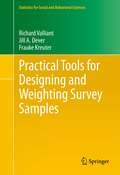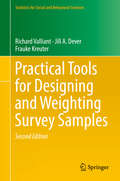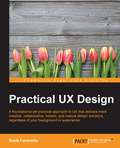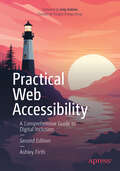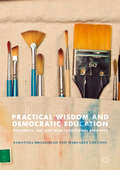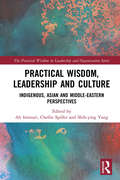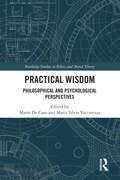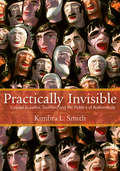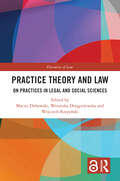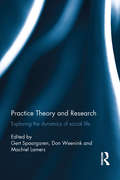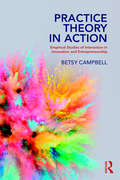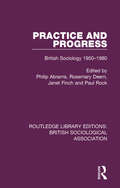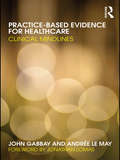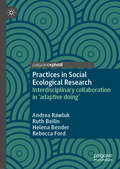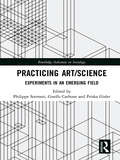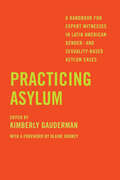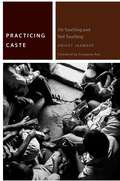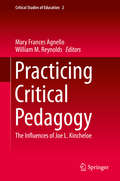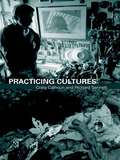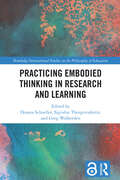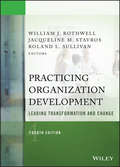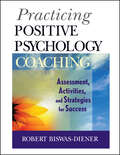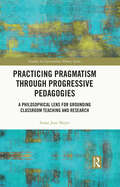- Table View
- List View
Practical Tools for Designing and Weighting Survey Samples
by Jill A. Dever Frauke Kreuter Richard ValliantSurvey sampling is fundamentally an applied field. The goal in this book is to put an array of tools at the fingertips of practitioners by explaining approaches long used by survey statisticians, illustrating how existing software can be used to solve survey problems, and developing some specialized software where needed. This book serves at least three audiences: (1) Students seeking a more in-depth understanding of applied sampling either through a second semester-long course or by way of a supplementary reference; (2) Survey statisticians searching for practical guidance on how to apply concepts learned in theoretical or applied sampling courses; and (3) Social scientists and other survey practitioners who desire insight into the statistical thinking and steps taken to design, select, and weight random survey samples. Several survey data sets are used to illustrate how to design samples, to make estimates from complex surveys for use in optimizing the sample allocation, and to calculate weights. Realistic survey projects are used to demonstrate the challenges and provide a context for the solutions. The book covers several topics that either are not included or are dealt with in a limited way in other texts. These areas include: sample size computations for multistage designs; power calculations related to surveys; mathematical programming for sample allocation in a multi-criteria optimization setting; nuts and bolts of area probability sampling; multiphase designs; quality control of survey operations; and statistical software for survey sampling and estimation. An associated R package, PracTools, contains a number of specialized functions for sample size and other calculations. The data sets used in the book are also available in PracTools, so that the reader may replicate the examples or perform further analyses.
Practical Tools for Designing and Weighting Survey Samples (Statistics For Social And Behavioral Sciences Ser. #51)
by Jill A. Dever Frauke Kreuter Richard ValliantThe goal of this book is to put an array of tools at the fingertips of students, practitioners, and researchers by explaining approaches long used by survey statisticians, illustrating how existing software can be used to solve survey problems, and developing some specialized software where needed. This volume serves at least three audiences: (1) students of applied sampling techniques; 2) practicing survey statisticians applying concepts learned in theoretical or applied sampling courses; and (3) social scientists and other survey practitioners who design, select, and weight survey samples. The text thoroughly covers fundamental aspects of survey sampling, such as sample size calculation (with examples for both single- and multi-stage sample design) and weight computation, accompanied by software examples to facilitate implementation. Features include step-by-step instructions for calculating survey weights, extensive real-world examples and applications, and representative programming code in R, SAS, and other packages. Since the publication of the first edition in 2013, there have been important developments in making inferences from nonprobability samples, in address-based sampling (ABS), and in the application of machine learning techniques for survey estimation. New to this revised and expanded edition: • Details on new functions in the PracTools package • Additional machine learning methods to form weighting classes • New coverage of nonlinear optimization algorithms for sample allocation • Reflecting effects of multiple weighting steps (nonresponse and calibration) on standard errors • A new chapter on nonprobability sampling • Additional examples, exercises, and updated references throughout Richard Valliant, PhD, is Research Professor Emeritus at the Institute for Social Research at the University of Michigan and at the Joint Program in Survey Methodology at the University of Maryland. He is a Fellow of the American Statistical Association, an elected member of the International Statistical Institute, and has been an Associate Editor of the Journal of the American Statistical Association, Journal of Official Statistics, and Survey Methodology. Jill A. Dever, PhD, is Senior Research Statistician at RTI International in Washington, DC. She is a Fellow of the American Statistical Association, Associate Editor for Survey Methodology and the Journal of Official Statistics, and an Assistant Research Professor in the Joint Program in Survey Methodology at the University of Maryland. She has served on several panels for the National Academy of Sciences and as a task force member for the American Association of Public Opinion Research’s report on nonprobability sampling. Frauke Kreuter, PhD, is Professor and Director of the Joint Program in Survey Methodology at the University of Maryland, Professor of Statistics and Methodology at the University of Mannheim, and Head of the Statistical Methods Research Department at the Institute for Employment Research (IAB) in Nürnberg, Germany. She is a Fellow of the American Statistical Association and has been Associate Editor of the Journal of the Royal Statistical Society, Journal of Official Statistics, Sociological Methods and Research, Survey Research Methods, Public Opinion Quarterly, American Sociological Review, and the Stata Journal. She is founder of the International Program for Survey and Data Science and co-founder of the Coleridge Initiative.
Practical UX Design
by Scott FaranelloA foundational yet practical approach to UX that delivers more creative, collaborative, holistic, and mature design solutions, regardless of your background or experience About This Book * Improve your UX design awareness and skills * Gain greater confidence to know when you have delivered a "good" UX design * Learn by example using a book designed by a UX mind for a UX mind Who This Book Is For This book is written for the beginner as well as the experienced UX practitioner, regardless of team size, company size, or job title. It is also intended for anyone with an interest in UX, engages with UX, is involved in any way in interactive problem solving and design, or simply wants to learn more about what we do, how we do it, and why those in the UX field are so passionate about wanting to do it better. What You Will Learn * Awaken your UX mind and dispel the myths of non-UX thinkers * Create the six optimal conditions for your best ideas to appear * Identify and incorporate the ten design principles found in all good UX design * Develop a broader understanding of Information Architecture (IA) to better engage, guide, and inform * Develop a fundamental understanding of patterns and the properties that create them * Raise your level of UX maturity with a strategy that transforms your approach to problem solving and helps others understand the true value of your work * Utilize important tools of the UX trade that never go out of style * Increase your knowledge of UX, incorporate valuable ideas and insights into your work, and look at design from a very unique perspective In Detail Written in an easy-to-read style, this book provides real-world examples, a historical perspective, and a holistic approach to design that will ground you in the fundamental essentials of interactive design, allow you to make more informed design decisions, and increase your understanding of UX in order to reach the highest levels of UX maturity. As you will see, UX is more than just delighting customers and users. It is also about thinking like a UX practitioner, making time for creativity, recognizing good design when you see it, understanding Information Architecture as more than just organizing and labeling websites, using design patterns to influence user behavior and decision making, approaching UX from a business perspective, transforming your client's and company's fundamental understanding of UX and its true value, and so much more. This book is an invaluable resource of knowledge, perspective, and inspiration for those seeking to become better UX designers, increase their confidence, become more mature design leaders, and deliver solutions that provide measurable value to stakeholders, customers, and users regardless of project type, size, and delivery method. Style and approach An in-depth, easy to read, and entertaining journey into and through the world of UX using real-world examples, thoughtful illustrations, and engaging quotes to inspire and explain fully the how and why of UX in a practical and impactful way and used immediately in your own work.
Practical Web Accessibility: A Comprehensive Guide to Digital Inclusion
by Ashley FirthEveryone deserves to use the Internet. An estimated 1.3 billion people experience significant disability. That’s 16percent of the world’s population, or one in six of us. At the same time, over 96 percent of the one million most popular websites have an accessibility issue. Add to this the massive rise in legal cases around sites not being accessible, including Beyoncé, Disney, and Netflix, and you have an important topic that more and more people are starting to engage with.In this updated and revamped second edition of the Amazon technology chart-topping Practical Web Accessibility, you’ll be guided through a broad range of disabilities and access needs. You’ll understand the ways these users typically engage with the web, the barriers they often face, and practical advice on how your websites and content can be compliant, but more than that, inclusive and enjoyable to use. There’s also a new chapter on “Outsourcing Accessibility,” exploring third party “bolt-on” tools, “build your own website” platforms like Wix, and popular design systems. You‘ll explore whether they’re helpful or detrimental in the fight to make the web more accessible.Throughout this book you’ll learn to test for, spot, and fix web accessibility issues for a wide range of physical and mental impairments. Featuring content from the latest compliance frameworks, including the newly released WCAG 2.2 and exploratory concepts in WCAG 3, you’ll see how to go beyond the basic requirements in order to help your users. You’ll also learn that an accessible approach won’t just help people with disabilities, it will improve your website for everyone.This book comes complete with practical examples you can use in your own sites, along with a brand-new approach to auditing and improving a website’s accessibility, and a team’s approach to it, based on tools created by the author and refined over years as a consultant — The FAIR framework and ACCESS checklist. With these tools, you can set up processes for yourself and your team that will drastically improve the accessibility of your sites and, importantly, keep them that way in the future. Suitable for those of any profession or experience level, Practical Web Accessibility gives you all the information you need to ensure that your sites are truly accessible for the modern, inclusive web. If you would like to learn about web accessibility in a clear and actionable way, this book is for you.What You Will LearnA greater understanding of a vast range of disabilities that have online access needs, and the issues they typically face accessing content online.Ways to apply the practical steps required to cater for those needs.How to take your sites, and colleagues, on a journey from being inaccessible to accessible.The importance of accessibility in your designs, code, content, and more.The best ways to test andimprove your sites, so you can be compliant, and truly accessible. Who This Book Is For Anyone, regardless of what they do, who wants to learn how to make websites and their content more accessible for those with disabilities. In the world of web, the book has been used by front and backend developers, designers, product and project managers, team and business leaders.
Practical Wisdom and Democratic Education: Phronesis, Art And Non-traditional Students
by Samantha Broadhead Margaret GregsonThis book explores the development of practical wisdom, or phronesis, within the stories of four mature students studying for degrees in art and design. Through an analysis informed by the ideas of Basil Bernstein and Aristotle, the authors propose that phronesis – or the ability to deliberate well – should be an intrinsic part of a democratic education. As a number of vocational and academic disciplines require deliberation and the ability to draw on knowledge, character and experience, it is essential that no student feels their experience puts them at a disadvantage. The authors argue that democratic education should allow each participant to feel enhanced, included and able to participate in order to create a constructive and reciprocal dialogue. This work will be of value to students and scholars interested in democratic education, the experiences of non-traditional students, and the sociology of education.
Practical Wisdom, Leadership and Culture: Indigenous, Asian and Middle-Eastern Perspectives (The Practical Wisdom in Leadership and Organization Series)
by Ali IntezariDespite the growing attention towards the importance of practical wisdom in business today, little research has been done about the concept of practical wisdom in the Indigenous, Asian and Middle-Eastern traditions. Contemporary studies of wisdom are dominated by the philosophical traditions of Western thought, which is based on the ancient Greek concepts of wisdom. Much less is known about how practical wisdom, as illuminated by these other traditions, can be implemented in today’s organizational settings. This book thus fills an important gap in understanding wisdom and how it is applied in a poly-cultural world. Wisdom is culturally bound. Wisdom is poly-cultural and interweaves individuality and communality. Practical wisdom is inextricably connected to many needs of contemporary personal and professional life. Moreover, the increasingly growing poly-culturality around the world requires a better understanding of how practical wisdom is understood in different cultures and traditions. Accordingly, there is a need for a) poly-cultural understanding of the concept of wisdom and b) the role of practical wisdom in a world crying out for wisdom. This book underlines the importance of developing a poly-cultural and interdisciplinary understanding of the concept of practical wisdom in today’s complex environment. The book offers significant insight into the implications of the non-Western traditions of wisdom and how such an understanding of the non-Western traditions can help us better and more critically understand and appropriately address new multi-faceted complex emerging phenomena. While the Western traditions offer valuable insight into the implication of wisdom in modern life, an integrated view that brings together the Western and non-Western traditions can provide a more critical and practical insight into how to apply practical wisdom in a contemporary poly-cultural environment.
Practical Wisdom: Philosophical and Psychological Perspectives (Routledge Studies in Ethics and Moral Theory)
by Mario De Caro; Maria Silvia VaccarezzaFeaturing original essays from leading scholars in philosophy and psychology, this volume investigates and rethinks the role of practical wisdom in light of the most recent developments in virtue theory and moral, social and developmental psychology. The concept of phronesis has long held a prominent place in the development of Aristotelian virtue ethics and moral education. However, the nature and development of phronesis is still in need of investigation, especially because of the new insights that in recent years have come from both philosophy and science. The essays in this volume contribute to the debate about practical wisdom by elucidating its role in empirical psychology and advancing important new research questions. They address various topics related to practical wisdom and its development, including honesty, ecocentric phronesis, social cognitive theory, practical wisdom in limited-information contexts, Whole Trait Theory, skill models, the reciprocity of virtue, and challenges from situationism. Practical Wisdom will interest researchers and advanced students working in virtue ethics, moral psychology, and moral education.
Practically Invisible: Coastal Ecuador, Tourism, and the Politics of Authenticity
by Kimbra Smith<p>The community of Agua Blanca, deep within the Machalilla National Park on the coast of Ecuador, found itself facing the twenty-first century with a choice: embrace a booming tourist industry eager to experience a preconceived notion of indigeneity, or risk losing a battle against the encroaching forces of capitalism and development. The facts spoke for themselves, however, as tourism dollars became the most significant source of income in the community. <p>Thus came a nearly inevitable shock, as the daily rhythms of life--rising before dawn to prepare for a long day of maintaining livestock and crops; returning for a late lunch and siesta; joining in a game of soccer followed by dinner in the evening--transformed forever in favor of a new tourist industry and the compromises required to support it. As <i>Practically Invisible</i> demonstrates, for Agua Blancans, becoming a supposedly "authentic" version of their own indigenous selves required performing their culture for outsiders, thus becoming these performances within the minds of these visitors. <p>At the heart of this story, then, is a delicate balancing act between tradition and survival, a performance experienced by countless indigenous groups.</p>
Practice Theory and Law: On Practices in Legal and Social Sciences (Discourses of Law)
by Maciej Dybowski, Weronika Dzięgielewska and Wojciech RzepińskiThis book engages the field of practice theory in order to consider law as a social practice.Taking up the theoretical concept of practices, the contributors to this volume maintain that law can be fruitfully understood as one among other social practices. Including perspectives from philosophers of language, experts in practice theory, linguists and legal philosophers, the book examines the twin questions of what it means for law to be considered a practice, and what law’s place is among other social practices. The book is comprised of three parts. The first provides a broad methodological framework for discussing how the concept of practice is used in the social sciences, and in law. The second deals with specific problems arising from the use of the concept of practice in the legal context, and from the intersection of different social practices. The third part identifies and addresses the consequences of applying insights from practice theory to law. Together, they offer a comprehensive consideration of what is at stake in understanding law as a social practice.This book will appeal to sociolegal scholars, sociologists of law, philosophers of language and action, as well as philosophers of law and legal theorists.Chapter 15 of this book is freely available as a downloadable Open Access PDF at http://www.taylorfrancis.com under a Creative Commons Attribution (CC-BY) 4.0 license.Chapter 8 of this book is freely available as a downloadable Open Access PDF at http://www.taylorfrancis.com under a Creative Commons Attribution-ShareAlike (CC-BY-SA) 4.0 license.
Practice Theory and Research: Exploring the dynamics of social life
by Gert Spaargaren, Don Weenink and Machiel LamersThere has been an upsurge in scholarship concerned with theories of social practices in various fields including sociology, geography and management studies. This book provides a systematic introduction and overview of recent formulations of practice theory organised around three important themes: the importance of analysing the role of the non-human alongside the human; the reflexive nature of social science research; and the dynamics of social change. Combining a rich variety of detailed empirical research examples with discussion of the relevance of practice theories for policy and social change, this book represents an excellent sourcebook for all academic and professional researchers interested in working with practice theory.
Practice Theory in Action: Empirical Studies of Interaction in Innovation and Entrepreneurship
by Betsy CampbellThis book explores intra-team interaction in workplace settings devoted to technological breakthroughs and innovative entrepreneurship. The first set of studies to investigate these economically important institutions through the lens of talk-at-work, this book begins by discussing the ethnomethodological traditions of Conversation Analysis and institutional interaction and linking them to innovation and entrepreneurship. The book offers rich and detailed empirical accounts of teams talking new technologies and new ventures into being. By focusing on the observable language of teams in action, the book reveals the situated practices that teams use to enact their work, including the means by which team members verbally grapple with the uncertainties inherent in doing work in uncharted domains. The book presents important findings about the conversational accomplishment of work and demonstrates the value of examining the practices of teams in action. A valuable contribution to studies of talk-in-interaction, as well as entrepreneurship-as-practice, this book can help to bridge the gap between scholarly investigations and the practical experiences of entrepreneurs. The author closes by considering the ways that practice-based studies of entrepreneurial work can improve issues of diversity and inclusion within the entrepreneurial ecosystem. This book is intended to serve as an invaluable sourcebook for scholars and students interested in innovation, entrepreneurship, and organizations as well as those focused on applied Conversation Analysis. The book’s insights are presented in a richly detailed manner while remaining accessible to readers who are new to the methodologies and activity contexts.
Practice and Progress: British Sociology 1950-1980 (Routledge Library Editions: British Sociological Association #1)
by Philip Abrams, Rosemary Deem, Janet Finch and Paul RockOriginally published in 1981 Practice and Progress is a collection examining the changes that have occurred in the theories, methodologies and practices of sociology, in the institutional and educational setting of the subject, and in British society. The themes pursued include the professionalization of sociology its development and standing in the universities; the impact on it of Marxism and feminism and the major debates over positivism and empiricism, quantitative methods, linguistic analysis; and numerous other crucial methodological and theoretical concerns.
Practice-based Evidence for Healthcare: Clinical Mindlines
by John Gabbay Andrée le MayThis book challenges the evidence-based practice movement to re-think its assumptions. Firmly rooted in real practice while drawing lucidly on a great breadth of theoretical frameworks, it examines afresh how clinicians use knowledge. Evidence-based practice has recently become a key part of the training of all health professionals. Yet despite its ‘gold-standard’ status, it is faltering because too much effort has gone into insisting on an idealised model of how clinicians ought to use the best evidence, while not enough has been done to understand why they so often don’t. Practice-based Evidence for Healthcare is a groundbreaking attempt to redress that imbalance. Examining how clinicians actually develop and use clinical knowledge day-to-day, the authors conclude that they use ‘mindlines’– internalised, collectively reinforced, tacit guidelines. Mindlines embody the composite and flexible knowledge that clinicians need in practice. They are built up during training and continually updated from a wide range of formal and informal sources. Before new evidence becomes part of practitioners’ mindlines, it is transformed by their interactions with colleagues and patients via their communities of practice and networks of trusted colleagues. To explore how mindlines work Gabbay and le May draw on a wide range of disciplines to analyse their detailed observations of clinical practice in the UK and the US. Their conclusions and provocative recommendations will be of value to all practitioners, health service managers, policymakers, researchers, educators and students involved in the promotion of evidence-based practice.
Practices in Social Ecological Research: Interdisciplinary collaboration in 'adaptive doing'
by Helena Bender Andrea Rawluk Ruth Beilin Rebecca FordAimed at those at the forefront of social ecological thinking, this book presents a practice-oriented process to navigate the complex, interdisciplinary challenges of our time. The book brings together insights from the social sciences and beyond to introduce readers to ‘adaptive doing’ - a continuous and iterative process of experiential learning that provides an accessible structure and process for integrating a range of knowledge and practices. As part of the ‘adaptive doing’ learning cycle, the authors argue for a common platform, symbolically called ‘the agora’, where multiple ways of understanding can be discussed. In this space, participants can work from practice and narratives, toward meaning, knowledge formation and practice change.The book demonstrates three reframing tools for social ecological practice that provide readers with multiple ways of holistically entering the social ecological domain and expanding their perspectives with a view to changing practice. ‘Adaptive doing’ is presented as a catalyst for a new generation of social ecological research, in which participants honour their disciplinary foundations while being ready to collaborate within each new system, and each new engagement: being able to act now, for social ecological recognition and change.
Practicing Art/Science: Experiments in an Emerging Field (Routledge Advances in Sociology)
by Philippe Sormani Guelfo Carbone Priska GislerOver the last two decades, multiple initiatives of transdisciplinary collaboration across art, science, and technology have seen the light of day. Why, by whom, and under what circumstances are such initiatives promoted? What does their experimental character look like - and what can be learned, epistemologically and institutionally, from probing the multiple practices of "art/science" at work? In answer to the questions raised, Practicing Art/Science contrasts topical positions and insightful case studies, ranging from the detailed investigation of "art at the nanoscale" to the material analysis of Leonardo’s Mona Lisa and its cracked smile. In so doing, this volume brings to bear the "practice turn" in science and technology studies on the empirical investigation of multifaceted experimentation across contemporary art, science, and technology in situ. Against the background of current discourse on "artistic research," the introduction not only explains the particular relevance of the "practice turn" in STS to tackle the interdisciplinary task at hand, but offers also a timely survey of varying strands of artistic experimentation. In bringing together ground-breaking studies from internationally renowned scholars and upcoming researchers in sociology, art theory and artistic practice, as well as history and philosophy of science, Practicing Art/Science will be essential reading for practitioners and professionals in said fields, as well as postgraduate students and representatives of higher education and research policy more broadly.
Practicing Asylum: A Handbook for Expert Witnesses in Latin American Gender- and Sexuality-Based Asylum Cases
by Kimberly GaudermanA free ebook version of this title is available through Luminos, University of California Press's Open Access publishing program. Visit www.luminosoa.org to learn more. This multidisciplinary volume brings together experienced expert witnesses and immigration attorneys to highlight best practices and strategies for giving expert testimony in asylum cases. As the scale and severity of violence in Latin America has grown in the last decade, scholars and attorneys have collaborated to defend the rights of immigrant women, children, and LGBTQ+ persons who are threatened by gender-based, sexual, and gang violence in their home countries. Researchers in anthropology, history, political science, and sociology have regularly supported the work of immigration lawyers and contributed to public debates on immigration reform, but the academy contains untapped scholarly expertise that, guided by the resources provided in this handbook, can aid asylum seekers and refugees and promote the fair adjudication of asylum claims in US courts. As the recent refugee crisis of immigrant mothers and children and unaccompanied minors has made clear, there is an urgent need for academics to work with other professionals to build a legal framework and national network that can respond effectively to this human rights crisis.
Practicing Caste: On Touching and Not Touching (Commonalities)
by Aniket JaawarePracticing Caste attempts a fundamental break from the tradition of caste studies, showing the limits of the historical, sociological, political, and moral categories through which it has usually been discussed. Engaging with the resources phenomenology, structuralism, and poststructuralism offer to our thinking of the body, Jaaware helps to illuminate the ethical relations that caste entails, especially around its injunctions concerning touching. The resulting insights offer new ways of thinking about sociality that are pertinent not only to India but also to thinking the common on a planetary basis.
Practicing Cooperation: Mutual Aid beyond Capitalism (Diverse Economies and Livable Worlds)
by Andrew ZitcerA powerful new understanding of cooperation as an antidote to alienation and inequality From the crises of racial inequity and capitalism that inspired the Black Lives Matter movement and the Green New Deal to the coronavirus pandemic, stories of mutual aid have shown that, though cooperation is variegated and ever changing, it is also a form of economic solidarity that can help weather contemporary social and economic crises. Addressing this theme, Practicing Cooperation delivers a trenchant and timely argument that the way to a more just and equitable society lies in the widespread adoption of cooperative practices. But what renders cooperation ethical, effective, and sustainable?Providing a new conceptual framework for cooperation as a form of social practice, Practicing Cooperation describes and critiques three U.S.-based cooperatives: a pair of co-op grocers in Philadelphia, each adjusting to recent growth and renewal; a federation of two hundred low-cost community acupuncture clinics throughout the United States, banded together as a cooperative of practitioners and patients; and a collectively managed Philadelphia experimental dance company, founded in the early 1990s and still going strong. Through these case studies, Andrew Zitcer illuminates the range of activities that make contemporary cooperatives successful: dedicated practitioners, a commitment to inclusion, and ongoing critical reflection. In so doing he asserts that economic and social cooperation must be examined, critiqued, and implemented on multiple scales if it is to combat the pervasiveness of competitive individualism.Practicing Cooperation is grounded in the voices of practitioners and the result is a clear-eyed look at the lived experience of cooperators from different parts of the economy and a guidebook for people on the potential of this way of life for the pursuit of justice and fairness.
Practicing Critical Pedagogy
by William M. Reynolds Mary Frances AgnelloThis edited text recaptures many of Joe L. Kincheloe's national and international influences. An advocate and a scholar in the social, historical, and philosophical foundations of education, he dedicated his professional life to his vision of critical pedagogy. The authors in this volume found mentorship, as well as kinship, in Joe and express the many ways in which he and his work made profound differences in their work and lives. Joe's research always pushed the limits of what critically reflective and informed teaching entailed, never diluting the import of comprehending the complexity of sociopolitical, cultural, economic, and educational discourses and practices. Dedicated to a praxis of social and political activism rooted in students' development as citizens and workers, the labor of teachers as action researchers, cultural workers, and social mediators is always at the heart of all he achieved. We who were so influenced directly and indirectly by him knew his genius and relished the generosity with which he shared his ideas, advice, encouragement, and art. The world is better because of Joe L. Kincheloe scholarship--inextricably related to "critical" critical thinking and enactment of education that tenaciously interrupts complacency, mediocrity, always responding thoughtfully to particular educational contexts.
Practicing Culture (Taking Culture Seriously)
by Craig Calhoun Richard SennettPracticing Culture seeks to revitalize the field of cultural sociology with an emphasis not on abstract theoretical debates but on showing how to put theoretical sources to work in empirical research. Culture is not just products and representations but practices. It is made and remade in countless small ways and occasional bursts of innovation. It is something people do – and do in rich variety and distinctive contexts as engaging case studies from the book reveal. For example: in Russia’s most Western city, Kaliningrad, residents dig for artifacts symbolizing a German past – even though their parents only migrated to what was once Konigsberg after WWII in the USA, fans of professional wrestling pride themselves on being smart enough to know how much is trickery and how the tricks work yet still believe in the contest. Practicing Culture will reshape and invigorate the sociology of culture, not only through internal development, but through enhanced connections to the interdisciplinary social theory and to related fields like the sociology of knowledge and ethnography. It will prove an essential tool for students and researchers of cultural theory, contemporary social theory and cultural sociology.
Practicing Embodied Thinking in Research and Learning (Routledge International Studies in the Philosophy of Education)
by Sigridur Thorgeirsdottir Donata Schoeller Greg WalkerdenThis book delves into the embodied ground of thinking, illuminating the transition from theorising about the embodied mind to actively practising embodied thinking in research, teaching, and learning. The authors speak from immersing themselves in novel methods that engage the felt, experiential dimensions of cognition in inquiry.The turn to embodiment has sparked the development of new methodologies within phenomenology, pragmatism, and cognitive science. Drawing on Eugene Gendlin’s philosophical work on felt understanding, and Francesco Varela’s enactivist approach, contributors explore innovative embodied thinking methods such as Focusing, Thinking at the Edge, micro-phenomenology, and mindfulness practices. They demonstrate the practical applications of these methods in research, teaching, and learning, highlighting their liberating and empowering potential for researchers and students. In an age marked by information overload and societal polarisation, methods of embodied thinking provide an innovative edge to critique, complementing more traditional approaches to critical thinking with listening skills and reflexive care.This book shows how heeding the essential, yet often overlooked, embodied grounds of critical and creative thinking can deepen and strengthen each of research, teaching, and learning. It will interest philosophers of education and educators in higher education in particular, as well as researchers and postgraduate students from philosophy, and the cognitive and social sciences, who are curious about how embodied thinking can enrich research, teaching, and learning.
Practicing Organization Development
by William J. Rothwell Roland L. Sullivan Jackie StavrosGet on the cutting edge of organization development Practicing Organization Development: Leading Transformation and Change, Fourth Edition is your newly revised guide to successful organization development. This edition has been updated to explore the cutting edge of change management, leadership development, organizational transformation, and society benefit. These concepts are explored through emerging and increasingly accepted strengths-based approaches such as: appreciative inquiry, emotionally and socially intelligent leadership, positive organization development, and sustainable enterprises. This edition offers both theoretical concepts and guides to practical applications, providing you with the knowledge, techniques, and tools to put organizational development to effective use in the workplace. Organization development is an evolving field focused on understanding and positively impacting the human system processes of groups, teams, organizations, and individual leaders. Thorough organization development results in increased effectiveness, improved health, and overall success. This book shows how to attain positive change by: identifying contemporary themes in organization development, executing organization development approaches, as well as elevating and extending research agenda. This book also illustrates how to influence organizational stakeholders, and how to use this influence to enact key organization development practices. This new edition is enhanced by: Updated chapter-by-chapter lesson plans, contributor-submitted PowerPoint lesson templates, sample syllabi, and workshop agendas Revised sample exercises, a test bank, and additional case studies Expanded online appendices that cover regional organization development concepts from around the globe, as well as overviews of additional special issues Organization development is quickly becoming an important aspect of MBA curricula. Practicing Organization Development: Leading Transformation and Change, Fourth Edition gives graduate and doctorate program participants a comprehensive overview of organization development, the resources to learn the field, and the tools to apply their knowledge.
Practicing Positive Psychology Coaching
by Robert Biswas-DienerDiscover proven strategies for applying positive psychology within your coaching practiceWritten by Robert Biswas-Diener, a respected researcher, psychologist, life and organizational coach, and expert in positive psychology, Practicing Positive Psychology Coaching presents a wide range of practical interventions and tools you can put to use right away in your coaching practice.Each intervention is clearly outlined and, where appropriate, illustrated by case studies from organizational and life coaching. Providing unique assessments that can be used to evaluate client resources and goals, this practical guide introduces tools unique to this book that every professional can use in their practice, including: Findings from new research on goal commitment strategies, motivation, growth-mindset theory, and goal revision A decision tree for working specifically with Snyder's Hope Theory in the coaching context An easy-to-use assessment of "positive diagnosis," which measures client strengths, values, positive orientation toward the future, and satisfaction Measures of self-esteem, optimism, happiness, personal strengths, motivation, and creativity Guidance for leading clients through organizational and common life transitions including layoffs, leadership changes, university graduation, middle age, and retirementFilled with reflective exercises for use in your own personal and professional development, Practicing Positive Psychology Coaching also includes guidance and recommendations for marketing a positive psychology coaching practice.
Practicing Pragmatism through Progressive Pedagogies: A Philosophical Lens for Grounding Classroom Teaching and Research (Studies in Curriculum Theory Series)
by Susan Jean MayerThis book contributes to the contemporary revival of pragmatism as a practical and ultimately, as Mayer argues, necessary philosophical stance within democratic schools. Given that pragmatism addresses the question of how people can move forward in the absence of transcendent Truth, the author shows how pragmatism also—and not incidentally—provides grounds for pluralistic democratic societies to move forward in the absence of shared belief systems. Weaving together philosophical analysis and classroom discourse research, Mayer explores the relationships among pragmatism, progressive educational theory, and democratic knowledge construction processes and their implications for enacting progressive educational practices in schools. Several original, research-based heuristics that can serve in reliably identifying, studying, and orchestrating distinctively democratic knowledge construction processes are presented. The importance of granting all students a share of interpretive authority is also emphasized. For in learning to observe and reflect on one’s own terms, attend closely to the observations and interpretations of one’s peers, and reason collaboratively in a transparent and principled manner, young people are enculturated into essential democratic values, commitments, and practices. This book is written for a general audience and is intended for all those concerned with strengthening the democratic character of schools and societies. It is likely to appeal to scholars, researchers, and practitioners with interests in philosophy and classroom discourse and curriculum studies, as well as philosophers of education and the social sciences more broadly.
Practicing Presence: Simple Self-Care Strategies for Teachers
by Lisa LucasMost teachers enter the field of education to make a difference in children's lives. But many end up, as author Dr. Lisa Lucas puts it, tired, wired, and running in circles. This leads to many new teachers abandoning the profession or to burnout among veteran teachers.In Practicing Presence: Simple Self-Care Strategies for Teachers, Dr. Lucas invites the reader to learn how to fully inhabit the present moment. Written in an informal and conversational tone, Practicing Presence is filled with ideas, exercises, checklists, personal anecdotes, and practices you can use to reframe and establish a mindset that will enhance your focus and engagement in the classroom.With approximately 50% of new teachers leaving the education field before the 5-year mark, it is more important than ever for educators to prioritize self-care. Each chapter of Practicing Presence includes self-care strategies that explore how to self-regulate, nurture self-acceptance, and promote compassion. Inside you'll find: Quotes and affirmations throughout the textsScientific research and reflections on how these theories and practices can apply to your own lifePaths to Mindful Teaching and how to integrate into your daily lifeAdditional resources and online content to further support your practice When teachers care for themselves deeply and deliberately, they are better able to care for the people that matter most in their lives'stheir students, friends, and families. Practicing Presence focuses not on doing, but rather on being present in the life of the classroom.
